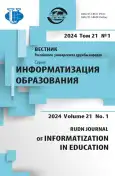Формирование коммуникативных умений обучающихся с помощью системы интерактивных диалогов Dailo, основанной на технологиях искусственного интеллекта
- Авторы: Дрейцер С.И.1,2
-
Учреждения:
- Московский городской педагогический университет
- ООО «Цереврум»
- Выпуск: Том 21, № 1 (2024)
- Страницы: 44-55
- Раздел: РАЗРАБОТКА УЧЕБНЫХ ПРОГРАММ И ЭЛЕКТРОННЫХ РЕСУРСОВ
- URL: https://journal-vniispk.ru/2312-8631/article/view/321375
- DOI: https://doi.org/10.22363/2312-8631-2024-21-1-44-55
- EDN: https://elibrary.ru/OMWFBB
- ID: 321375
Цитировать
Полный текст
Аннотация
Постановка проблемы. Педагогические технологии формирования коммуникативных умений постоянно совершенствуются, возникают новые методики и практики. Особый интерес представляет использование информационных технологий для развития коммуникативных профессиональных навыков. Однако на сегодняшний день недостаточно данных о том, какие есть специфические инструменты в области информационных технологий для формирования коммуникативных умений, как именно они применяются, какие механизмы задействуют. Рассматривается подход к информатизации образования на основе средств искусственного интеллекта, распространенных для формирования профессиональных коммуникативных умений среди сотрудников крупных компаний. Методология. Проанализированы возможности интерактивных диалоговых систем, реализованных с использованием технологий искусственного интеллекта, для формирования профессиональных коммуникативных умений. Разработаны коммуникативные сценарии с разными возможностями поведения для участника и критерии для контрольной оценки его коммуникативных умений. Экспериментальное исследование проведено в рамках деятельности отделов обучения персонала компаний. Участники - 35 сотрудников крупных компаний. Статистическая обработка результатов выполнена с помощью критериев Манна - Уитни и Пирсона. Результаты. Подтвердилось, что диалоговый тренажер обучает умению гибкого воспроизведения и импровизации в процессе диалога с удержанием его логики и сути. Во втором эксперименте полученные данные позволяют частично подтвердить эту гипотезу и порождают новое предположение, что инструмент может быть использован для диагностики определяющей рефлексии с помощью предоставления участникам доопределенных и недоопределенных задач. Заключение. Полученные данные свидетельствуют, что диалоговые симуляции улучшают коммуникативные навыки. Кроме того, диалоговые симуляции могут помочь диагностировать рефлексию, представляя задачи различной определенности. Эти гипотезы требуют дальнейшего изучения в рамках будущих исследований искусственного интеллекта в образовании.
Об авторах
Софья Ильинична Дрейцер
Московский городской педагогический университет; ООО «Цереврум»
Автор, ответственный за переписку.
Email: dreitsersi562@mgpu.ru
ORCID iD: 0000-0001-8549-1627
аспирант, департамент информатизации образования, институт цифрового образования, Московский городской педагогический университет; педагогический дизайнер, ООО «Цереврум»
Российская Федерация, 129226, Москва, 2-й Сельскохозяйственный пр-д, д. 4, корп. 1; Российская Федерация, 121205, Москва, б-р Большой, д. 42, стр. 1Список литературы
- Yakupov PV. Communication: definition of the concept, types of communication and its barriers. Vestnik GUU. 2016;(10):261-266. (In Russ.)
- Svetlyakova OA. Problems of developing communication skills of university students. Current Problems of the Humanities and Natural Sciences. 2014;(10):381-384. (In Russ.)
- Isakhanova AA. Communication skills of university graduates in social interaction. Kazan Pedagogical Journal. 2016;(5):143-149. (In Russ.)
- Mikhailova AG. Technologies for the formation of communicative readiness of future engineers in the context of professional training. Bulletin of NVGU. 2023;(2):100-109. (In Russ.)
- Kizlevich EE. Features of the organization of corporate education in the digital era. Professional Self-Determination of Youth in the Innovative Region: Problems and Prospects: Collection of Articles Based on the Materials of the All-Russian (National) Scientific and Practical Conference, Krasnoyarsk, November 14-25, 2022 (vol. 1, part 1). Krasnoyarsk: Krasnoyarsk State Agrarian University; 2023. p. 151-154. (In Russ.)
- Yoel SR, Akiri E, Dori YJ. Fostering graduate students’ interpersonal communication skills via online group interactions. Journal of Science Education and Technology. 2022;32:1-20. https://doi.org/10.1007/s10956-022-09998-5
- Tolsteneva AA, Galkina EN. Model for the formation of communication skills of service sector specialists. Bulletin of Minin University. 2013;(1):170-187. (In Russ.)
- Demina EA. Formation of communication skills among college students. Professional Education and Labor Market. 2018;(1):50-53. (In Russ.)
- Abdrakhmanova LV. Game teaching methods in the process of developing professional communication skills among students of a technical university. Bulletin of the Samara State Technical University. 2006;(44):17-21. (In Russ.)
- Gordienko TP, Pozdnyakova AYa. Information and communication technologies as a means of developing independent work skills among primary education students. Problems of Modern Pedagogical Education. 2018;(59-2):31-34. (In Russ.)
- Stepanenko EB, Belova SB. Digital technologies in the development of communication skills of primary school students. In: Matrosova ND, Lazykina OA. (compil.) Distance Learning: Realities and Prospects: Materials of the V All-Russian Scientific and Practical Conference, St. Petersburg, 13-14 February 2020. St. Petersburg: St. Petersburg Center for Assessment of the Quality of Education and Information Technologies; 2020. p. 111-116. (In Russ.)
- Lentovskaya AV. Application of information and communication technologies in the formation of communication skills in foreign language linguistic culture. Bulletin of Moscow University. Series 18. Sociology and Political Science. 2020;26(4):76-88. https://doi.org/10.24290/1029-3736-2020-26-4-76-88
- Vorontsov AB. The fate of educational activities in teenage school: content, methods and forms. Psychological Science and Education. 2015;20(3):56-69. (In Russ.)
- Elkonin DB. Age and individual characteristics of younger adolescents. Frolova YuI. (ed.) Psychology of a Teenager. Moscow: Russian Pedagogical Agency; 1997. p. 286-313. (In Russ.)
- Tsukerman GA. Conditions for the development of reflection in six-year-olds. Questions of Psychology. 1989;(2):39-46. (In Russ.)
- Chang B. Reflection in learning. Online Learning. 2019;23(1):95-110. https://doi.org/10.24059/olj.v23i1.1447
- Selvam VJ. Interactive teaching method for communication enhancement: fostering effective communication skills in education. European International Journal of Philological Sciences. 2023;3(7):5-8. https://doi.org/10.55640/eijps-03-07-02
- Lo WL, Hsieh MC. Teaching communication skills: using Gagne's model as an illustration. Tzu Chi Medical Journal. 2019;32(1):19-25. https://doi.org/10.4103/tcmj.tcmj_59_19
- Cebrià J, Palma C, Segura-Bernal J, Gracia R, Pérez J. Communication skills training as a protection factor of professional burn out in a primary care practitioners. Revista de Psiquiatria de la Facultad de Medicina de Barcelona. 2006;33:34-40.
Дополнительные файлы









